This article was published by ASU News. Read it at its original source here.
This year, the Sedona Forum — the signature annual event of the McCain Institute for International Leadership — goes both virtual and public, inviting the community to hear from U.S. and world leaders, celebrities, and philanthropists as they discuss real solutions to the problems facing our world today.
With the theme of “Defending Democracy,” the forum is an opportunity to hear about the world’s most pressing issues from top experts and policymakers from around the world and on both sides of the aisle. Leading public figures from the world of business such as co-founder of Schmidt Futures and former CEO of Google Eric Schmidt and current CEO of YouTube Susan Wojcicki; public servants like Senate Minority Leader Mitch McConnell and Speaker of the House Nancy Pelosi; global humanitarians such as Ben Affleck, José Andrés and Angelina Jolie; and military leaders like Chairman of the Joint Chiefs of Staff Gen. Mark Milley and former Secretaries of Defense Gen. James Mattis and Mark T. Esper will discuss issues related to the rise of China, modern cyber warfare, the Russia challenge, disinformation and the erosion of democracy, combating human trafficking and much more.
The event runs Wednesday–Friday, April 28–30. Find the full agenda and register for the event at thesedonaforum.org, and check back in here through Friday as the ASU News staff covers a sampling of the available panels.
‘AFRICA: INNOVATION, OPPORTUNITY, AND INVESTMENT’
2–2:45 EDT — U.S. Rep. Karen Bass, former Sen. Jeff Flake, actor and philanthropist Ben Affleck and Cindy McCain
The “Future of Africa” panel, moderated by former U.S. Sen. Jeff Flake of Arizona, featured a discussion by Cindy McCain; U.S. Rep. Karen Bass of California, chair of the Subcommittee on Africa, Global Health and Global Human Rights; and actor Ben Affleck, founder of the Eastern Congo Initiative nonprofit. Here is an excerpt of their remarks:
Bass: One thing that I think is so important for people to know is that the discussions, the legislation, the hearings around Africa are all very bipartisan. Long term, we’re looking at the continent from the point of view of investment and as a partner, as opposed to looking at Africa as a charity case.
McCain: No. 1 in my mind is to focus on women’s rights and the issues that face women. They are the backbone of African society. The informal sector of the African economy is so important, and women play an outsize role in economics and are not really counted as part of that.
Affleck: Initially when I got involved, it was because of the war that had happened. And the degree to which the country was destabilized was such that many NGOs weren’t working there. There was a lot of interest in having celebrities participate, and I understand the cynicism that surrounds that. In fact what I thought was, there was nobody with the ability to generate interest or enthusiasm in the world community or the press to pay attention to what was a profound humanitarian crisis. We’ve learned what works and how not to spend money frivolously and how not to treat Africa as a charity case.
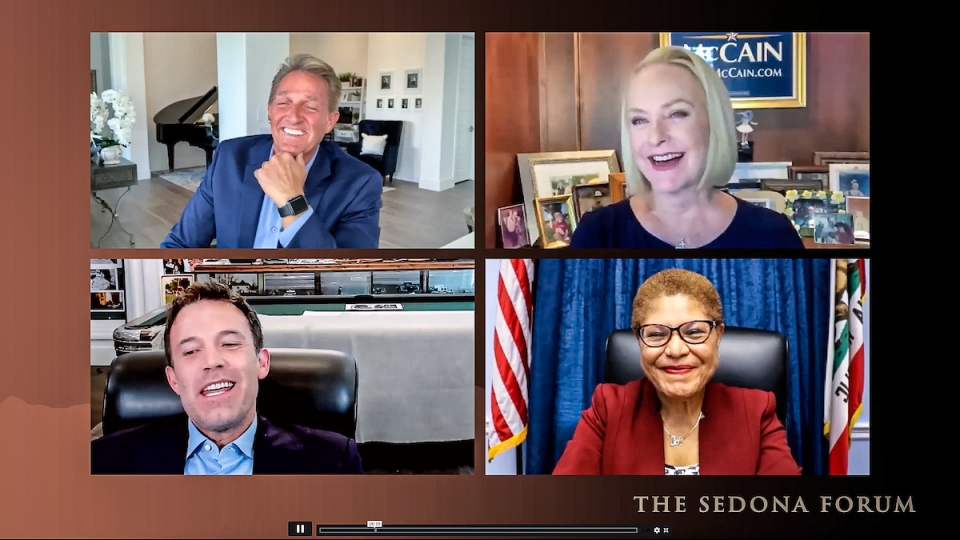
Bass: The slogan out of the African Union is “Trade, Not Aid.” That’s another body we could be helping to strengthen and uplift and provide technical support to.
McCain: We need to continue our alliances with partners who defend democracy and freedom not just in Africa but around the world. It’s very exciting when you can see free and fair elections anywhere on the continent of Africa and that has happened. But then you see what’s going on in Ethiopia right now and that’s where our alliances have failed us.
Affleck: This notion that we’ve thrown a lot of aid at Africa and nothing has worked is a profoundly dishonest way of looking at the situation. What Europe and North America have in fact done is extract a great deal of wealth from Africa, disenfranchised Africans and oppressed them. In the Congo, the only country ever owned — owned — by a human being, King Leopold in the 1800s, 10 million Congolese died and an enormous amount of rubber was extracted. That alone so far dwarfs all the aid ever spent on Africa in its history. What we want to advocate for, and the best way to do aid, is to do it in a way that uses models that have been really successful. That’s reflected in a new project called Asili, in which we combine traditional philanthropy with market principles, where you develop a form of philanthropy that is ultimately sustainable business practices.
Bass: I agree with the problems with China, in terms of the quality of work, debt and the work force. I remember being in the Democratic Republic of Congo and seeing no one employed except the Chinese building roads. Ben illustrates exactly what I was saying in terms of a new paradigm in terms of how we provide assistance, in which the idea is to work yourself out of that job.
‘ONE-ON-ONE LEADERSHIP DISCUSSION’
1–1:30 p.m. EDT — Former Sen. Kelly Ayotte and Senate Minority Leader Mitch McConnell
Sens. Mitch McConnell and Kelly Ayotte engaged in a one-on-one discussion about leadership on April 30, beginning with a question about his “long game,” also the title of his 2016 memoir. The longest-serving Senate Republican leader in American history said that he never intended to run for president, only to have a lasting career in the Senate, which he has achieved.
McConnell shared what he believes are the two most important guiding factors in leadership: the ability to listen and the ability to focus.
Ayotte asked McConnell about another leadership principle he espoused in his book: “You can start too late, but never too soon.” McConnell said it’s something he learned the hard way, after being sued and removed from the ballot early in his career when he failed to read the residence requirements for candidates.
He learned other lessons along the way, too, like the fact that “you can never get in trouble for things you do not say.” Ayotte noted McConnell is often referred to as a man of few words, to which he replied, “Actually, contrary to what people think, I’m perfectly willing to talk. The question is, is it to my advantage to talk? And I think that depends on the issue.”
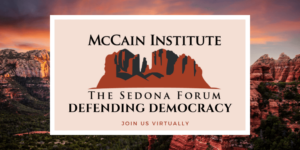
Turning to the topic of current issues, Ayotte asked McConnell his thoughts about the current administration’s announcement to withdraw all troops from Afghanistan by Sept. 11.
“Well, our friend John McCain used to remind people the war on terror doesn’t end when we give up,” McConnell said. “I think it’s a very unfortunate decision.”
He continued, saying that he fears the U.S.’s removal of troops would result in the Taliban reclaiming power before the end of the year.
“I think this administration has decided the war on terror is overhyped, (that it’s) not as big a threat as some things, so they’re going to end it by not confronting it,” McConnell said.
Ayotte also asked McConnell for his thoughts on the recent military coup in Myanmar, a country he has had an interest in for decades, having corresponded with the now-deposed leader Aung San Suu Kyi as far back as the early 1990s.
Following the atrocities committed by the military against the Rohingya, McConnell said, “everybody expected her to do something about it … (and) she was basically abandoned by the rest of the world because she couldn’t produce an outcome that was impossible to produce.”
McConnell says he stuck by her, though, blocking efforts to penalize her during this period.
“The obvious answer is the only hope for Burma to become a genuine democracy is to stick with her,” he said.
He also praised the Biden administration for “squeezing what few sanctions and levers we have left against this military regime.”
‘ELIMINATING HUMAN TRAFFICKING AND FORCED LABOR IN GLOBAL SUPPLY CHAINS: WHOSE RESPONSIBILITY IS IT?’
9–9:45 a.m. EDT Friday — Introduction by Cindy McCain. Former U.K. Prime Minister Theresa May, Professor Genevieve Le Baron and Sen. Rob Portman. Hosted by Kristen Abrams, McCain Institute
Nearly two decades ago the international community came together to pass laws to combat human trafficking and forced labor. Yet an estimated 25 million people globally still are being exploited in fields, factories and commercial sectors of industry, said Cindy McCain, who introduced the April 30 session on the topic.
“Exploitation of people is one of the most heinous human rights crimes of the day,” said McCain, who is the chair of the board of trustees of the McCain Institute. “Despite our best efforts, we still have a long way to go … labor must not be forced or coerced and that people are not for sale.”
The action-oriented discussion was hosted by Kristen Abrams, senior director of combating human trafficking at the McCain Institute. Abrams led a 45-minute panel discussion on the subject with Genevieve LeBaron, professor of politics and international relations at the University of Sheffield in England; Theresa May, former prime minister of the United Kingdom; and Sen. Rob Portman of Ohio.
The vast majority of the estimated 25 million in forced labor are in private sector industries such as agriculture, construction, manufacturing and domestic work. Another 5 million are exploited in the commercial sex industry. And despite best efforts to eradicate human trafficking and forced labor through research, legislation and other strategies, the abusers are usually one step ahead of the law.
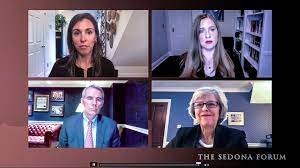
LeBaron said several countries have passed legislation and other initiatives on modern-day slavery and only now are they starting to see results from data and research.
“We finally have reliable data and evidence about what does work and what doesn’t work to combat forced labor in supply chains,” LeBaron said. “That data isn’t easy to find given that this is an illegal practice. It’s extraordinarily difficult to get access to victims in certain countries and contexts where governments and business are very keen for people not to have access. … We’re at this pivotal moment of knowing what works and what doesn’t work.”
Portman said the U.S. government has done a good job on the procurement front since 2012 in their dealings with contractors and subcontractors, checking to see if they have a history of forced labor, withholding paychecks or seizing passports.
“We’ve passed legislation that has criminal penalties involved with it,” Portman said. “Companies are paying attention.”
May was also instrumental in crafting and ultimately getting modern-day slavery legislation passed in the U.K, which went after gangs and organized crime syndicates and required large companies to review their supply chains.
“The challenge now is to move that from companies, just being able to put a statement in their accounts to actually making sure that they’re being effective in the action that they’re taking and effective in the consideration they’re giving to their supply chains so that they really are identifying what is happening,” May said.
The panel agreed that awareness is key in combating this issue and that not only should the media and businesses be mindful, so should private citizens.
“Many people just don’t realize that modern slavery is happening in their towns and cities in their locality,” May said. “Or that the goods they’re buying may very well be on the backs of slave labor and forced labor, and in some cases, child labor. So raising awareness is something that I think we have to do.”
‘THE WORLD DISORDER: FACING THE CHINA CHALLENGE’
11–11:30 a.m. EDT Friday — Former Sen. Joe Lieberman and former Secretary of State Henry Kissinger
Before kicking off a panel discussion on the challenges of China, former Secretary of State Henry Kissinger paid a special tribute to the late Sen. John McCain, explaining how they first met, how he helped secure McCain’s release from a Vietnam prison, their lifelong friendship and, above all, McCain’s passion for and support of American values — something Kissinger deeply admired.
Former Sen. Joe Lieberman, the host of the April 30 discussion “The World Disorder: Facing the China Challenge,” asked Kissinger if there’s a way to manage a relationship with China that’s mutually beneficial and avoids conflict, yet stays true to the United States’ values.
As the first American diplomat to visit China in the early ’70s, as a national security adviser to President Richard Nixon, Kissinger believes the U.S. must be in constant dialogue with China. He pointed out that in the early ’70s, much of the focus was on threats from the Soviet Union. But in current times, Kissinger explains that China poses a great threat because of its economic, military and elemental technological capacity — a combination of advantages the Soviet Union didn’t have.
“China is a huge economic power, in addition to being a significant military power,” Kissinger said. “So it is a very challenging task for America. And it’s important that we unite on that and don’t divide ourselves into one group that is in favor of the moral aspect and another one that’s in favor of the strategic aspect. The two have to be linked.”
Lieberman asked Kissinger to reflect on the relationship between China and Russia now, and how the countries are seemingly coming closer and closer together. He asked how that may complicate America’s desire to improve and peacefully manage the U.S. relationship with China.
Kissinger said it’s not in America’s interest to drive the two sides together, and pointed out that the U.S. hasn’t explored the possibility of diplomatic conversations with Russia in some time.
“I am not saying that diplomacy will always lead to beneficial results, but I am saying that if we are forced into confrontation, which we must be prepared to be — in defense of our values, that we can say to ourselves that we’ve made every effort to achieve peaceful outcomes, compatible with our values.”
‘PROMOTING DEMOCRACY’
9–9:30 a.m. EDT Former Secretary of State Madeleine Albright and Chairman of the Carter Center Board Jason Carter
Democracy may be the best system of government and, in theory, should be quite resilient, but after 2020, America’s example as a role model is being questioned, according to former U.S. Secretary of State Madeleine Albright, who spoke during an April 30 session titled “Promoting Democracy.”
“The last time I was abroad was in February of last year at something called the Munich Security Conference,” Albright said. “At the meeting we were like a joke, frankly … people were trying to figure us out and really didn’t take us seriously.”
The discussion was hosted by Jason Carter, a member of the Georgia State Senate and a trustee of the Carter Center, a Georgia-based nonprofit opened by his grandfather, former U.S. President Jimmy Carter. The half-hour discussion was a reunion of sorts as Albright served during Carter’s administration in the National Security Council as a liaison. A few years later, she served as the first female Secretary of State under President Bill Clinton from 1997 to 2001.
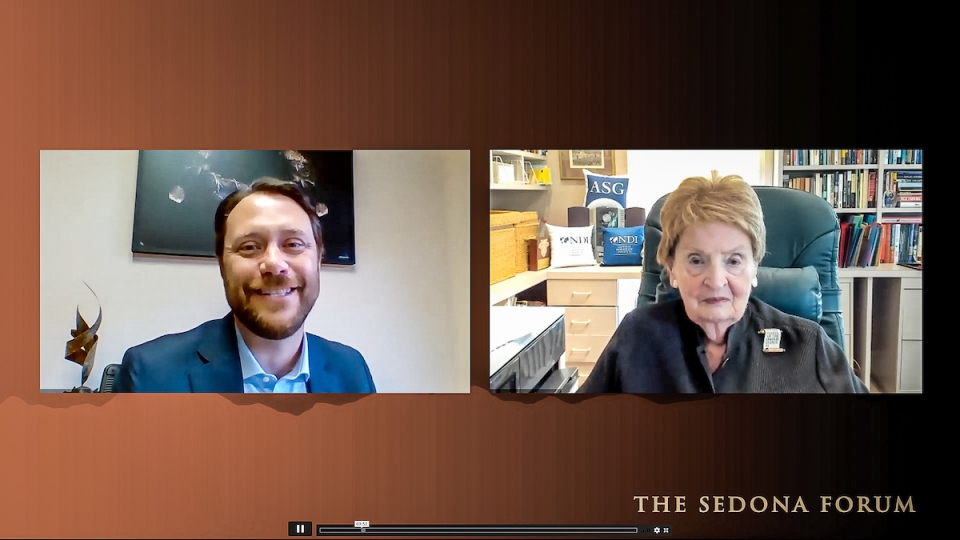
Albright, who immigrated to the U.S as a child from Czechoslovakia, said growing up her professor father constantly warned her that America was a great country but not infallible.
“He kept saying that he was very concerned that Americans didn’t see how fragile democracy was, and at the same time he’d say there is such a resiliency in democracy,” Albright said. “I think that we have proven in many ways democracy is never a done thing and that it is evolving. It is not bad to question and it is not bad to recognize that it’s far from perfect.”
Albright said the reawakening of race issues in this country and our human rights ideals have others in the world questioning the authority and authenticity of the U.S. She said these issues need to be discussed and confronted.
“It’s an opportunity to show the best that America can be,” Albright said.
She said America would do well to draw lessons from her 2018 book, “Fascism: A Warning.” Her tips include:
- Eliminate the practice of identity politics and hypernationalism.
- Don’t divide power.
- Encourage freedom of the press.
- Talk with people with whom you disagree.
“The best quote in the book actually comes from Mussolini,” Albright said. “He said, ‘If you pluck a chicken one feather at a time, nobody notices.”
‘U.S. FOREIGN POLICY IN THE ERA OF MULTILATERALISM’
2–3 p.m. EDT Thursday — Former U.S. Rep. Tom Perriello; Pardis Mahdavi, dean of social sciences in The College of Liberal Arts and Sciences at ASU; Sen. Mitt Romney of Utah; Sen. Jeanne Shaheen of New Hampshire; and Sen. Chris Coons of Delaware
We are living in a world full of disruptions: disruptions that have previously led the United States to wars as well as “exciting disruptions” — like in traditional hierarchies, for instance — that create opportunities to reimagine the world, former U.S. Rep. Tom Perriello explained in his introduction for the session titled “U.S. Foreign Policy in the Era of Multilateralism.”
The panel discussion was moderated by Pardis Mahdavi, dean of social sciences in The College of Liberal Arts and Sciences at Arizona State University. Her first question for Sen. Mitt Romney of Utah, Sen. Jeanne Shaheen of New Hampshire and Sen. Chris Coons of Delaware addressed whether the United States needs to retain dominance in particular regions of the world.
The senators felt similarly — that the United States will continue to be a global leader by working together with other countries.
“I think we need to stay engaged and to make significant investments and to work closely with our partners to retain our competitive advantage,” said Coons.
And to deal with the next major crisis, Coons added, the U.S. has to be honest about its shortcomings and address them.
“We’ve got some inspiring work going on the foreign relations committee and on other committees to pull together and to reinvest in American civics education, American innovation and manufacturing — things that make America more competitive. We’ve got hard work to do in our own communities and families and neighborhoods to make sure that people actually listen to each other more and respect each other more.”
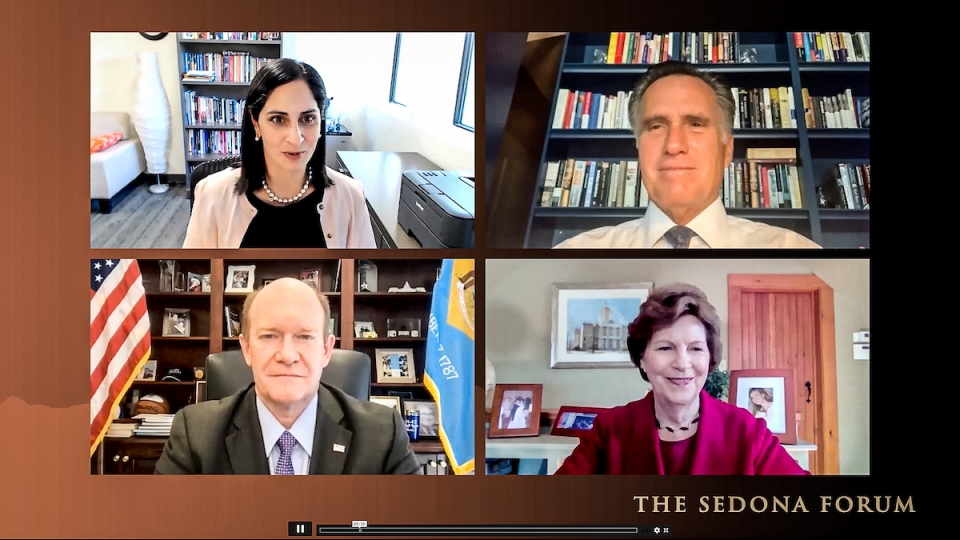
Romney is optimistic that with great leaders, the world can solve its biggest challenges. But he says those leaders aren’t only at the top.
“It’s leaders throughout the entire civilization, leaders in classrooms, leaders in businesses, leaders in churches, leaders in homes. We call upon leaders to show, by their own example, the principles that will keep us strong and free,” he said.
One of those principles, he says, is a commitment to the truth.
Relationships are also paramount, because the U.S. can’t solve problems alone. Right now, some of the most pressing issues include climate change and racial inequities.
Shaheen explained, “It’s important for us to think about tackling those in the context of not just the United States — and being honest with what’s happening here — but also in terms of world forums, where we can work with our allies and try and solve the big challenges that we all face.”
‘ONE-ON-ONE — LEADERSHIP DISCUSSION’
1–1:30 p.m. EDT — Speaker of the House Nancy Pelosi and McCain Institute Chairman of the Board Cindy McCain
Cindy McCain, philanthropist, businesswoman and widow of John McCain, engaged in a discussion with Speaker of the House Nancy Pelosi in a session titled “One-On-One Leadership” on April 29. Here’s an excerpt of their conversation:
McCain: You knew my husband for years. You two didn’t always agree but you always had a working relationship.
Pelosi: We had a loyalty. We had respect for each other’s point of view and that was at a time when bipartisanship was the norm. We had confidence in our own point of view and welcomed debate. It was invigorating.
McCain: The theme of this forum is “Defending Democracy.” You were on Capitol Hill on Jan. 6, when the attack occurred. What was it like to return to the floor of the House that night, after the insurrection? We watched with great anticipation to see what would happen.
Pelosi: It really was a horrible occasion when there was an insurrection incited by the president of the United States. When security came to me and pulled me off the podium, I thought it was a caution. I did not realize it was a necessity. The worse it got, the more definite it was that we had to go back that night. It was bipartisan that we would return to the Capitol. It was very necessary to return to the House and Senate and say, “We are here and we are going to effect the election of the president.”
McCain: My husband was a proud Republican, and he believed in the bipartisan approach to solve America’s challenges. Do you see a chance at all of bipartisanship?
Pelosi: We have a responsibility to find common ground. Infrastructure has never been a partisan issue. Its about the community in which we live, the safety of bridges, access to transportation and, now, broadband. In the country, it’s not partisan. People know what we need.
McCain: I appreciate those words because for those of us who live in the West, the growth has been phenomenal but the lack of infrastructure has been dismal.
‘THE NEED FOR A NEW INTERNATIONAL TECHNOLOGY ALLIANCE’
9–9:45 a.m. EDT Thursday — Schmidt Futures co-founder and former Google CEO Eric Schmidt, Sen. Mark Warner of Virginia and ASU President Michael Crow
ASU President Michael Crow interviewed the former CEO and Executive Chairman of Google Eric Schmidt about the pace of technology and where the United States needs to be to be competitive.
Crow asked Schmidt how education has changed since he was in school in the early 1970s.
“Computer science basically didn’t exist,” Schmidt said. “The biggest thing that has happened has been the improvement in computation. I calculated that my iPhone is 100 million times more powerful than the computer I used and shared in college, which was so large it was in the basement of a building. … Oh my God. What has Moore’s Law brought to us?”
Teenagers now are started on computer science by gaming and other visually intensive elements, Schmidt said.
“If you look at the great tech companies, they all came from simple things that scaled really fast,” Schmidt said. “Humans have trouble understanding how fast. Even I, after all these years, always underestimate how fast something small, if it’s architected just right, can explode. That principle, generally known as technology network effects, is bedeviling everyone else because politicians and everyone else are not used to something growing that fast and having such a big impact.”
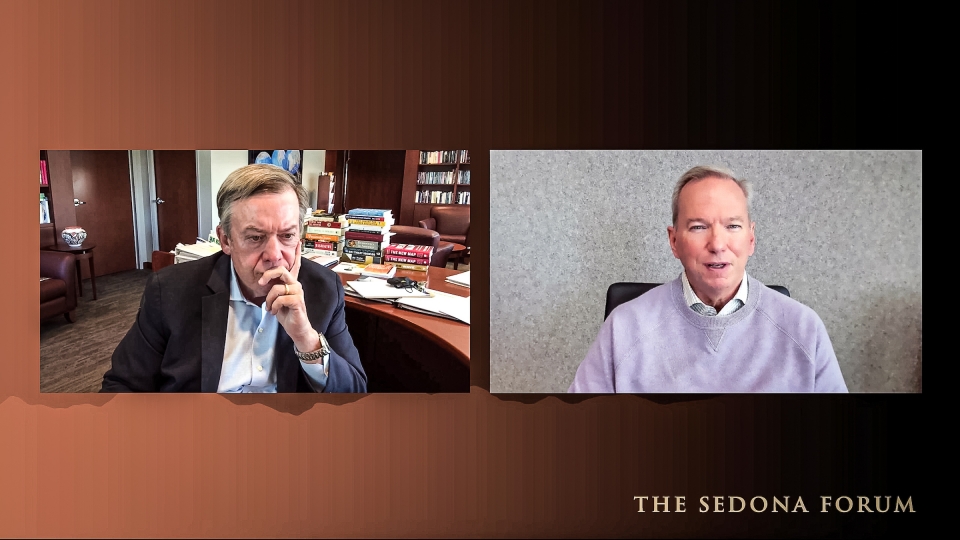
Could Schmidt see all this coming?
“Certainly not. When I got my PhD in the early 1980s, artificial intelligence had died,” he said.
Deep learning, a subset of machine learning in artificial intelligence that has networks capable of learning unsupervised from data that is unstructured or unlabeled, changed that.
“In about 25 years, you’ve gone from zero to infinite power and interest in AI.”
Crow asked Schmidt what he would call the present trajectory.
“Let’s look at the speed with which this has happened, because people don’t understand how profound this is,” Schmidt said. “When I was an undergrad, there was no computer science in colleges. Today, the No. 1 major, beating out politics and economics, is computer science. That’s in my generation. Today the most valuable companies in the U.S. — five or six — are all tech companies based on the principles of computer science. The most valuable companies in China — roughly three or four — are all computer science-based companies. There’s every reason to think that in one to two generations computing has gone from being something that interested nerds to these megalith structures. The teams that bring you these things now are thousands of people.”
Schmidt pointed out that something like Zoom has 3,000 employees and is growing fast.
“Did anyone in this audience know what Zoom was a year ago? No,” he said.
“Why do we need a national commission on artificial intelligence?” Crow asked Schmidt, who sits on the commission as chairman.
“We are woefully unprepared for AI as a country,” Schmidt said. “Right now we have a crisis. … We call for the nation to be AI-ready by 2025. … There’s so much we don’t know about AI. It’s the beginning of math. It’s the beginning of physics. It’s a whole new field.”
The commission recommends doubling AI research funding to reach $32 billion by 2026, establishing a technology competitiveness council, establishing a computer science educational model similar to ROTC, and other measures.
‘THE FUTURE OF TECHNOLOGY AND DEMOCRACY’
3–3:45 p.m. EDT Wednesday — YouTube CEO Susan Wojcicki and U.S. Sen. Ben Sasse of Nebraska
Susan Wojcicki, CEO of YouTube, discussed the possibilities and perils of technology with Sen. Ben Sasse, who started by asking her how parents have used YouTube during the pandemic.
“One of my visions for YouTube is for it to act as a very large public library, where anyone can access any kind of information for free,” Wojcicki said, citing how-to information, courses, speeches and lectures posted online.
“We saw homeschooling more than double in terms of people looking for that,” she said. “We also saw that suddenly all these institutions that people depended upon for their support, whether it was religious organizations, community schools that were shut down — YouTube became a lifeline for them in terms of posting videos or having live conversations and connecting community. So many people had to do something they’d never done before, like fix something in their house or cut hair.”
Sasse pointed out that Oxford University grew around its library.
“Do you envision wraparound communities to the YouTube library you’re building?” Sasse asked. “There’s so much potential that everyone could get education for free.”
Wojcicki talked about an experiment YouTube did where they gave internet access to people who had not had it before, then returned some time later to see what they used it for. (They tried to build a solar car.)
“It’s just this incredible ability to be able to learn new areas and empower themselves,” Wojcicki said. “In terms of classes, I think we can do a lot more. We’re probably in the very early stages of your comparison with Oxford. I’m not sure YouTube is the place to create those institutions. We can place content or enable content to be accessed in different ways. … What I think will happen is there will be third parties who will become those Oxfords. You can think of many different Oxfords on YouTube.”
Wojcicki then asked the senator about the challenges and opportunities when media no longer goes through legacy channels.
“Opportunities and challenges is the right way to think about it,” Sasse said. “Every new technology brings with it new potentials or nobody would be adopting it. There are upsides, but there are almost always tradeoffs, and we regularly fixate on a new technological development as heaven or hell. … The pencil was great because we could store our thoughts, but memorization went down. Our memories got a lot crappier. … To me, the disintermediation of these sectors is overwhelmingly good: travel agencies, stock brokerage, music publishing, book publishing — there used to me a lot more intermediaries in all those spaces than there are now.”
The conversation touched on the news business. Sasse asked Wojcicki about fake news about vaccines and how YouTube polices misinformation on its site.
When COVID-19 hit, YouTube consulted with health organizations — 85 of them, Wojcicki said. Regarding the wild rumor that 5G towers were spreading COVID-19: “That was a violation of our policies. We used a combination of machines and human reviewers.”
She described the process of identifying content that will lead to real-world harm.
“We really focused on raising up reliable sources,” she said.
‘STEPPING UP FOR THE GLOBAL REFUGEE CRISIS’
1–1:30 p.m. EDT Wednesday — UNHCR special envoy Angelina Jolie, Chobani founder and CEO Hamdi Ulukaya, U.S. Sen. Chris Coons of Delaware and Women Peace Network founder and executive director Wai Wai Nu
Wai Wai Nu, founder and executive director of Women Peace Network, provided a brief introduction to the “Stepping Up for Global Refugee Crisis” panel with actress and humanitarian Angelina Jolie and Chobani yogurt CEO Hamdi Ulukaya.
Nu shared that the number of refugees in the world today is the highest it has ever been in modern history — 26 million. She also shared about her own past as a refugee from Myanmar, a country where a brutal military regime has been producing refugees among her Rohingya community for generations.
“Nobody wants to be a refugee,” Nu said. “We must remember that refugees are also human beings with dreams, knowledge and abilities.”
U.S. Sen. Chris Coons served as moderator of the panel, posing several questions to Jolie, who has served for many years as a special envoy for the United Nations High Commissioner for Refugees, and Hamdi, an advocate for the role of the private sector in addressing the refugee crisis, who recently launched the Tent Partnership for Refugees to mobilize the global business community to do the same.
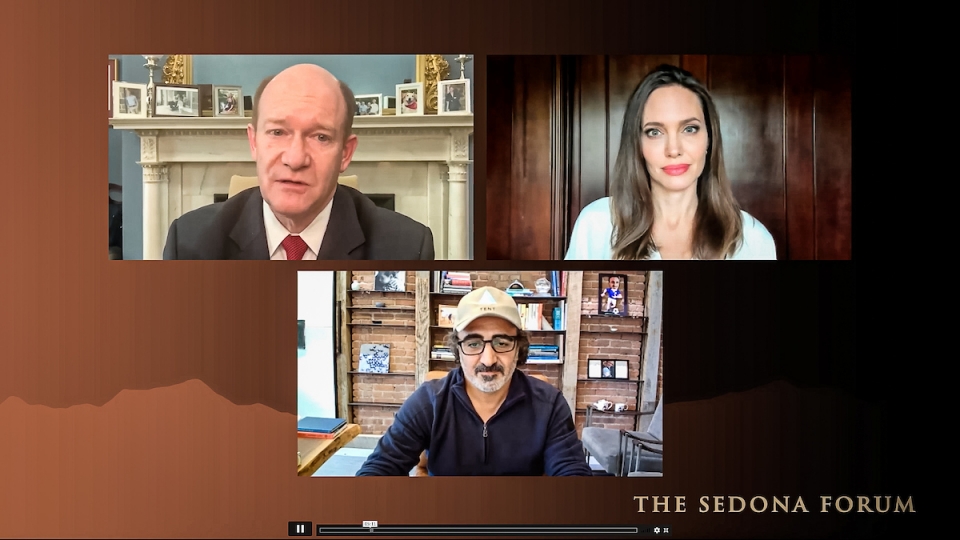
Echoing Nu’s assessment of the situation today, Jolie noted that the number of global refugees has doubled in the last decade and is “most likely going to go higher if we don’t address the climate crisis in the decade to come.”
While some refugee crises are caused by differences in religion or politics, such as the aforementioned Rohingya crisis that Jolie wrote about with the late Sen. John McCain in 2018, climate change is quickly becoming the biggest issue of concern among those working in the area.
“Darfur is (because of) lack of water,” Jolie said. “(There are) so many conflicts where it is the fight over resources” that causes the greatest conflict. And that’s also why there is no easy return home for those who have been displaced.
Hamdi’s parting call to action: “Hire refugees. You will never regret it.”
Jolie ended the session: “We have to look at where we’re failing. … We have to think about working from the ground up in the U.N. … not top down. We have to think carefully about our behavior internationally, and that we mean what we say when we say we believe in equality. We have to stand up.”
‘A CAUSE GREATER THAN’
11–11:45 a.m. EDT Wednesday — Arizona Cardinals wide receiver Larry Fitzgerald, chef and humanitarian José Andrés and U.S. Sen. Heidi Heitkamp of North Dakota
Larry Fitzgerald, wide receiver for the Arizona Cardinals, introduced the panel titled “A Cause Greater Than.” He said his success is often measured in wins and losses, but that his deepest sense of purpose has been found in the Larry Fitzgerald Foundation, which supports women with breast cancer.
“For Sen. McCain, it was a selfless approach to life, rooted in the core value demonstrated that ‘we’ is more important than ‘me,’” Fitzgerald said.
The session was a discussion between Sen. Heidi Heitkamp, a former senator from North Dakota, and José Andrés, a Spanish American chef and the founder of World Central Kitchen, a nonprofit that delivers meals to people affected by natural disasters.
Andrés said that food security is directly related to national security.
“These men and women south of the border are going hungry because of COVID and back-to-back-to-back hurricanes that destroyed all their crops,” he said.
“And the only option they have, when they have a few dollars left, is, ‘Where can I go to feed my children?’ What would you not do to feed your children?
“If we invest in a longer table and not higher walls, I believe America will do better. We won’t have an immigration problem because people will be happy where they live.”
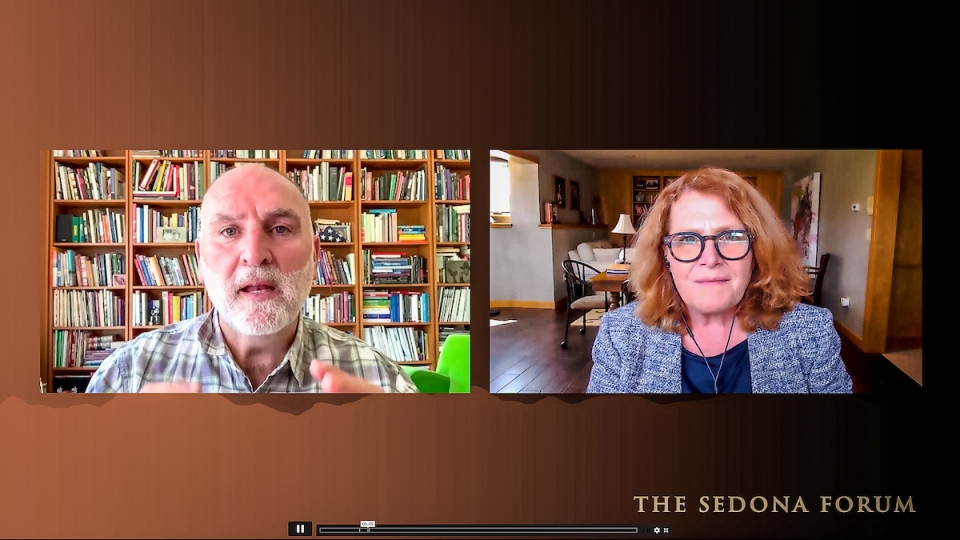
Heitkamp said that the pandemic highlighted hunger in America.
“We had so many in this country who had to drive in long food lines,” she said.
“And it’s not only a national security concern, but as you look at public health, one thing that was revealed to us was that obesity created vulnerability, a lack of resilience in the American population, regarding their likelihood of not only contracting COVID but of having serious consequences.
“When we ignore nutrition as part of the solution, we ignore a huge component of what needs to be done.”
WEDNESDAY KICKOFF
8:30–8:45 EDT Wednesday — McCain Institute Chairman of the Board Cindy McCain, Arizona Gov. Doug Ducey, ASU President Michael Crow and McCain Institute Executive Chair Josette Sheeran
Arizona dignitaries kicked off the seventh annual Sedona Forum on April 28 with an urgent call to advance American leadership in the world.
“There’s a lot of opportunity ahead for the emergence of new ways to solve problems, new ways to produce leaders, new ways to advance American values, new ways to use technology to advance the ideals of our democracy — all the things the McCain Institute was set up to do,” said Arizona State University President Michael Crow.
Josette Sheeran, executive chairman and interim director of the McCain Institute for International Leadership, said this is a landmark year for the gathering.
“This will be our biggest forum ever,” Sheeran said. “It will connect people from all over the globe.”
She called 2021 the most crucial year in her lifetime for looking at American leadership in the world.
“We’re at a critical time in the world,” Sheeran said. “You’ll see the conference this year will touch on all these subjects about, ‘What is American leadership in the world?’ We’ll hear from the freedom fighters around the world, those standing up for freedom, for innovation, for opportunity, for entrepreneurship, and we’ll connect and we hope to come out with some practical ideas to share with leaders of the world and to define our agenda for the year ahead.”
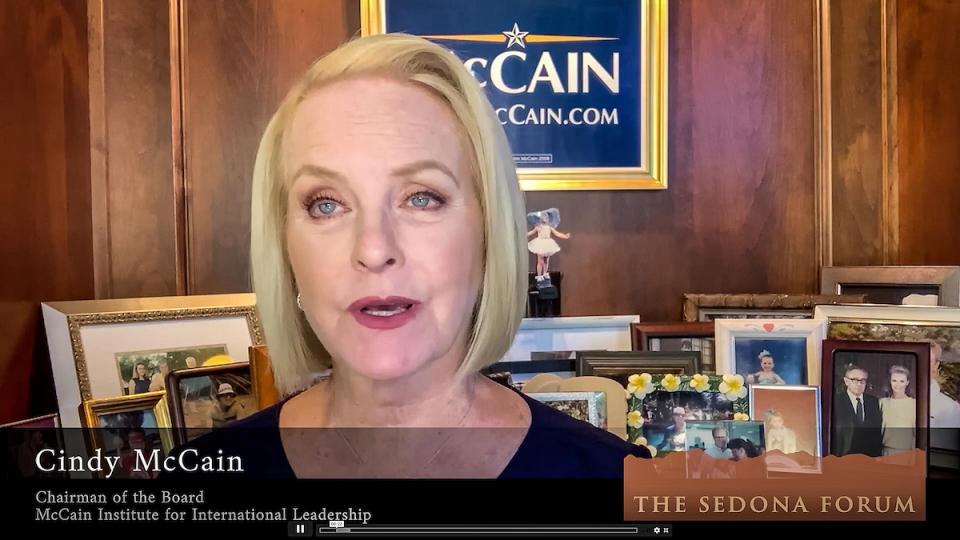
Cindy McCain, wife of the late senator and chair of the board of trustees of the McCain Institute, oversees the organization’s focus on advancing character-driven global leadership based on security, economic opportunity, freedom and human dignity.
“It was so important for John to bring people from all over the world to the place he loved the most to confront the issues facing the world each year,” she said.
Arizona Gov. Doug Ducey quipped about joining the McCains in another setting.
“Recently Cindy and I entered into an exclusive club, along with Sen. Jeff Flake,” Ducey said. “The Arizona GOP voted to censure us, giving us all the same honor as the legendary Sen. John McCain. This was the closest I’ll get to having the same legacy as Sen. McCain. Not a week goes by I don’t think of the late senator and his lasting mark on Arizona, our nation and the world.”
Mary Beth Faller, Jimena Garrison, Emma Greguska, Scott Seckel and Marshall Terrill contributed to this report.